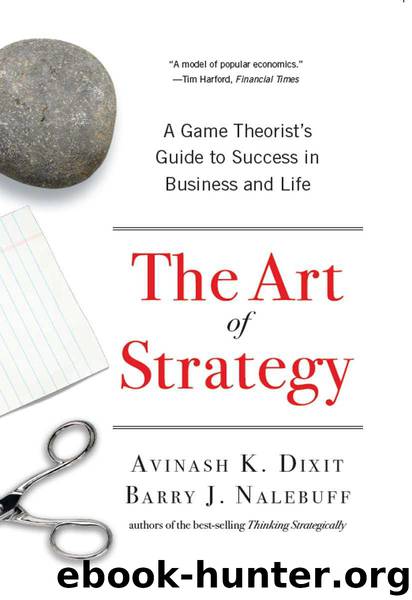The Art of Strategy: A Game Theorist's Guide to Success in Business and Life by Dixit Avinash K. & Nalebuff Barry J

Author:Dixit, Avinash K. & Nalebuff, Barry J. [Dixit, Avinash K.]
Language: eng
Format: mobi
Publisher: W. W. Norton & Company
Published: 2010-01-03T16:00:00+00:00
SCREENING AND SIGNALING
You are the chief personnel officer of a company, looking to recruit bright young people who have natural-born talent as managers. Each candidate knows whether he or she has this talent, but you don’t. Even those lacking the talent look for jobs in your firm, hoping to make a good salary until they are found out. A good manager can generate several million dollars in profits, but a poor one can rack up large losses quickly. Therefore you are on the lookout for evidence of the necessary talent. Unfortunately, such signs are hard to come by. Anyone can come to your interview wearing the right dress and professing the right attitudes; both are widely publicized and easy to imitate. Anyone can get parents, relatives, and friends to write letters attesting to one’s leadership skills. You want evidence that is credible and hard to mimic.
What if some candidates can go to a business school and get an MBA? It costs around $200,000 to get one (when you take into account both tuition and foregone salary). College graduates without an MBA, working in an environment where the specialized managerial talent is irrelevant, can earn $50,000 per year. Supposing people need to amortize the expense incurred in earning an MBA over five years, you will have to pay at least an extra $40,000 a year—that is, a total of $90,000 a year—to a candidate with an MBA.
However, this will make no difference if someone who lacks managerial talent can get an MBA just as easily as someone with this talent. Both types will show up with the certificates, expecting to earn enough to pay off the extra expense and still get more money than they could in other occupations. An MBA will serve to discriminate between the two types only if those with managerial talent somehow find it easier or cheaper to earn this degree.
Suppose that anyone possessing this talent is sure to pass their courses and get an MBA, but anyone without the talent has only a 50 percent chance of success. Now suppose you offer a little more than $90,000 a year, say $100,000, to anyone with an MBA. The truly talented find it worthwhile to go and get the degree. What about the untalented? They have a 50 percent chance of making the grade and getting the $100,000 and a 50 percent chance of failing and having to take another job for the standard $50,000. With only a 50 percent chance of doubling their salary, an MBA would net them only $25,000 extra salary on average, so they cannot expect to amortize their MBA expenses over five years. Therefore they will calculate that it is not to their advantage to try for the MBA.
Then you can be assured that anyone with an MBA does have the managerial ability you need; the larger pool of college graduates has sorted itself into two pools in just the right way for you. The MBA serves as a screening device. We emphasize
Download
This site does not store any files on its server. We only index and link to content provided by other sites. Please contact the content providers to delete copyright contents if any and email us, we'll remove relevant links or contents immediately.
| Biomathematics | Differential Equations |
| Game Theory | Graph Theory |
| Linear Programming | Probability & Statistics |
| Statistics | Stochastic Modeling |
| Vector Analysis |
Modelling of Convective Heat and Mass Transfer in Rotating Flows by Igor V. Shevchuk(6433)
Weapons of Math Destruction by Cathy O'Neil(6267)
Factfulness: Ten Reasons We're Wrong About the World – and Why Things Are Better Than You Think by Hans Rosling(4737)
A Mind For Numbers: How to Excel at Math and Science (Even If You Flunked Algebra) by Barbara Oakley(3302)
Descartes' Error by Antonio Damasio(3271)
Factfulness_Ten Reasons We're Wrong About the World_and Why Things Are Better Than You Think by Hans Rosling(3235)
TCP IP by Todd Lammle(3180)
Fooled by Randomness: The Hidden Role of Chance in Life and in the Markets by Nassim Nicholas Taleb(3110)
The Tyranny of Metrics by Jerry Z. Muller(3067)
Applied Predictive Modeling by Max Kuhn & Kjell Johnson(3066)
The Book of Numbers by Peter Bentley(2965)
The Great Unknown by Marcus du Sautoy(2691)
Once Upon an Algorithm by Martin Erwig(2644)
Easy Algebra Step-by-Step by Sandra Luna McCune(2628)
Lady Luck by Kristen Ashley(2576)
Practical Guide To Principal Component Methods in R (Multivariate Analysis Book 2) by Alboukadel Kassambara(2541)
Police Exams Prep 2018-2019 by Kaplan Test Prep(2540)
All Things Reconsidered by Bill Thompson III(2389)
Linear Time-Invariant Systems, Behaviors and Modules by Ulrich Oberst & Martin Scheicher & Ingrid Scheicher(2364)
